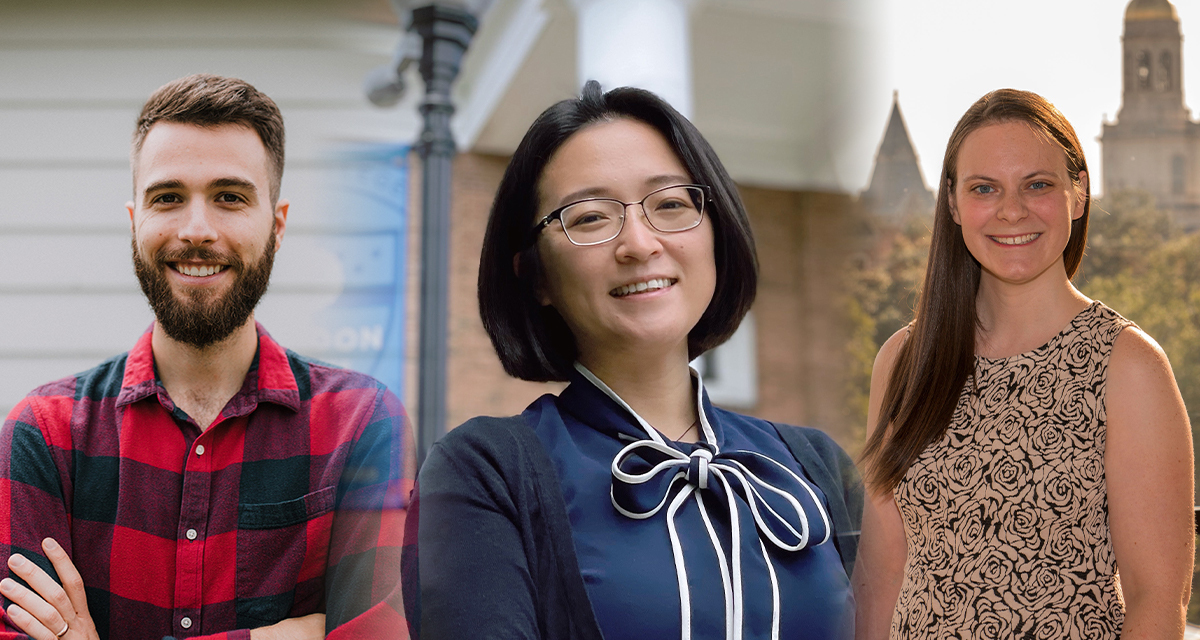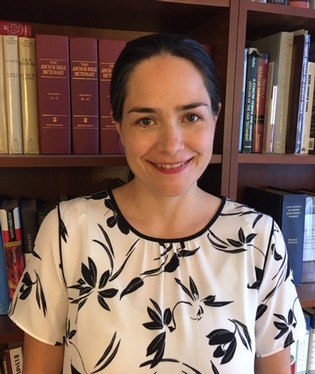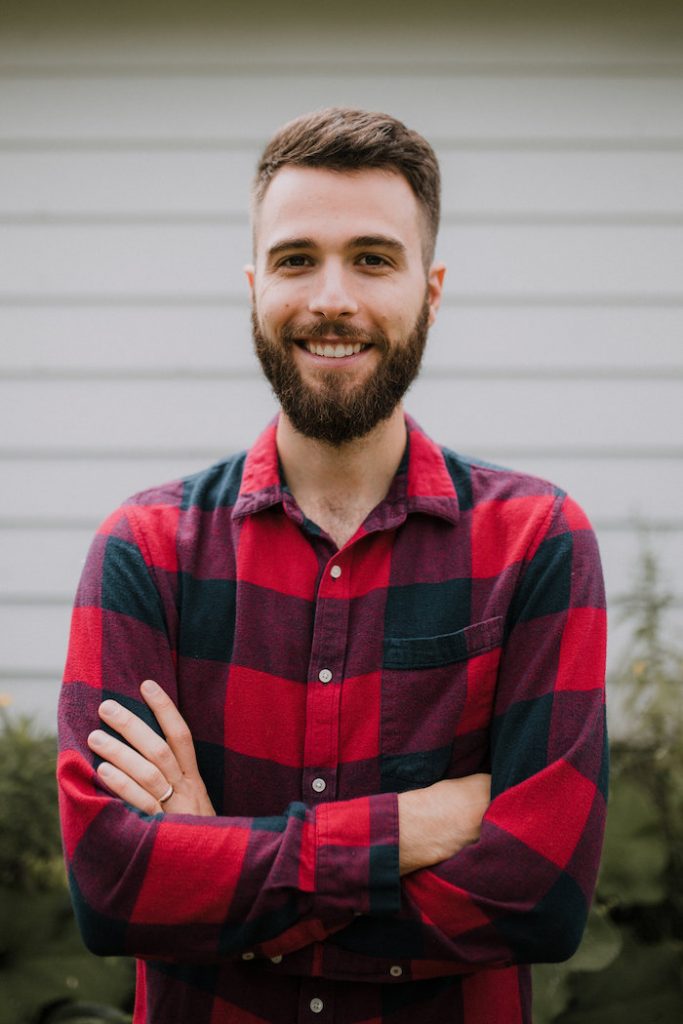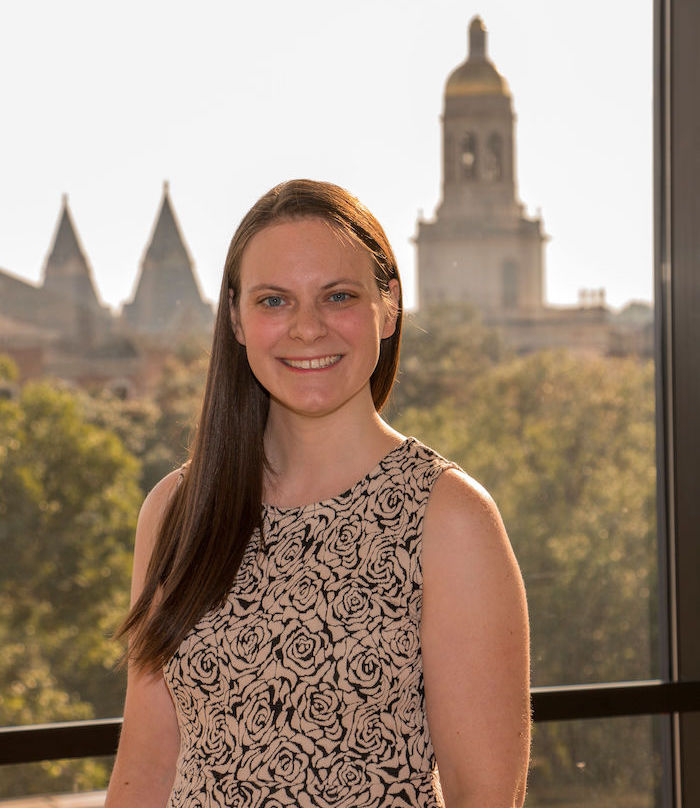New Faculty Faces This Fall
Along with the hundreds of new students joining the Gordon community this fall are several new faculty members. Here is a little about the experience and expertise they’re bringing to our community—and a snapshot of what each new professor looks like underneath their face masks.
Joanna Kline ’05, Assistant Professor of Old Testament
To Gordon, she brings knowledge of biblical wisdom literature and early Jewish and Christian biblical interpretations
Hails from: Minnesota
Fun fact: She taught English in Russia for two years before graduate school.
Favorite memory from Gordon (yes, she’s a Gordon grad too): “I was a T.A. for Steve Hunt, and in one New Testament review session attended by about 100 students, I sang a song I had made up about six arguments in Galatians to the tune of ‘Do-Re-Mi’ from the Sound of Music. It was very embarrassing (I’m not a good singer), but it has given me confidence in the classroom ever since!”
Academic expertise: “I’m especially interested in why biblical stories are told the way they are and how we can learn to read them well. Another big interest of mine is how biblical texts have been interpreted in Jewish and Christian communities from ancient times until the present.”
Opportunities for students to make an impact in your field: “I think students who understand the Bible and seek to apply it to their lives can make an impact wherever they end up. The obvious places are in ministry and academia, but I hope that students can use the skills and wisdom they acquire in biblical studies and Christian ministries classes in many different vocations.”
Yi Sun, Assistant Professor of Kinesiology
To Gordon, she brings knowledge of exercise physiology, biological aging, the gut microbiome and pharmacology.
Hails from: Harbin in Heilongjiang Province, China
Fun fact: She’s met several elite athletes in person, including Michael Phelps.
Academic expertise: “My expertise is to study how we can ultimately improve the quality of life for older adults via lifestyle interventions, such as exercise and dietary supplements. Using both human and animal models, my research focuses on keeping the health and independence of the elderly. My projects are broadly related to the prevention of age-associated physical and cognitive disability.”
How faith informs her work: “As we study the impact of physical activity on health and diseases, I view it as stewardship and redemption. We steward our bodies to good health, and we redeem loss with disease. In my everyday work and life, I believe as a Christian, it is my responsibility to do my best and serve our students. With a strong work ethic and be persistent in difficult situations, I do all to the glory of God.”
Why she decided to become a kinesiologist: “My family and the environment I grew up have influenced me a lot. My dad used to be a professional cyclist, while my mom is a doctor. I’ve always been curious how we can combine these two fields (sports and medicine) together. While I was doing my undergrad at Beijing Sport University in China, I was fortunate to work with elite athletes from various sports. I became interested in the mechanisms behind the movement and how sports nutrition, exercise physiology, sport psychology, motor control and other aspects work together to affect an athlete’s performance.”
Gregory Deddo, Assistant Professor of Art
To Gordon, he brings his background as an interdisciplinary artist and experience in painting, photography and digital media
Hails from: Chicagoland
Fun fact: He was born in Scotland.
Academic expertise: “People have always used visual language to make sense of the world around them and connect with one another. As a visual artist, I am interested in the many different reasons why people make and share images today. I use painting, photography, video and other media to think through questions about memory, identity and history.”
How faith informs his work: “I believe that the arts are central to a fuller understanding of the sacraments, worship as engaged practice, the good of material and earthly work, and what it means to be made in God’s image.”
Opportunities for students to make an impact in your field: “I am convinced of the Church’s need for a fuller theological understanding of the arts and the art world’s need for Christian voices. The arts have a unique potential to bring together a diversity of people, materials and ideas. It is my hope that students can understand and use the tools of visual language to practice reconciliation in their life and careers.”
Mandy (Mengqi) Liu, Assistant Professor of Economics and Business
To Gordon, she brings knowledge of development and health economics with a concentration on human capital, and child and adolescent well-being.
Hails from: Wenzhou in Zhejiang Province, China
Fun fact: Before graduate school, she worked as a journalist in Beijing, China.
Academic expertise: “My academic specialty is understanding how people make decisions for themselves and their families when they have relatively limited resources. I focus on exploring the factors that impact on children and adolescents’ health and education, and how we can improve their future life.”
How faith informs her work: “I believe that work is to glorify God. My faith guides me to find my heart for my work, which is using my knowledge to really help people. My passion in economics is to use the tools to understand people’s behavior better so that I can design and apply interventions to help people. My faith leads me to care about people who live in poverty or disadvantaged situations. Teaching at a Christian College and educating more students to help disadvantaged people is my dream job.”
Why she decided to become an economist: “My interest in economics grew from my desire to better understand how to improve the lives of disadvantaged people using the empirical tools available through economic research. Prior to graduate school, I was a journalist in China. As a journalist, I traveled throughout China and observed the circumstances faced by those with low socioeconomic status that have systematically deprived them of basic health, education and other necessities. I wanted to better learn the causes of these circumstances and find ways to help disadvantaged individuals.”
Erica Oldaker, Assistant Professor of Mathematics
To Gordon, she brings knowledge of mathematical physics related to quantum mechanics and quantum chaos.
Hails from: “All over,” including California, Norway, Utah, Missouri, Tennessee, Texas and Virginia
Fun fact: She’s a newlywed. Erica and her husband had a small pandemic wedding in August of 2020, which was attended by about 20 people and was streamed on YouTube.
Academic expertise: “Big picture: I’m interested in mathematical physics, which means that I study math problems that are motivated by ideas in physics. More specifically: I study the properties of mathematical objects called quantum graphs. From a physics perspective, this is modeling the energy and movement of tiny particles that behave like waves (electrons and photons, for example). Mathematically, a graph is like a connect-the-dots drawing, so we are kind of imagining that these tiny wave-particles are traveling along the lines in this drawing and using equations to model that phenomenon.”
How faith informs her work: “I always like to say that I see mathematics as the language with which God wrote the universe. In some small way, I believe that studying that language can teach us something about his character. Obviously, Scripture is the first and final authority on who God is, but for me at least, studying the mathematical concept of infinity (for example) has helped me to understand the vastness of God in a new way. I think that’s why I am drawn to mathematical physics—because I love seeing his fingerprints all over creation.”
What inspired her to become a mathematician: “I actually knew I wanted to get a Ph.D. in math since I was about 10 years old (I was an odd child). My story is definitely in the minority in that regard, but I think that what inspired me to keep going when things got difficult goes back to what I said about math and my faith. Every time I thought about giving up, I’d run into something that struck me anew with awe and wonder at the beauty of math within God’s creation. The journey hasn’t always been easy, but those moments of joy continue to inspire me to be a mathematician.”
 The Bell
The Bell




